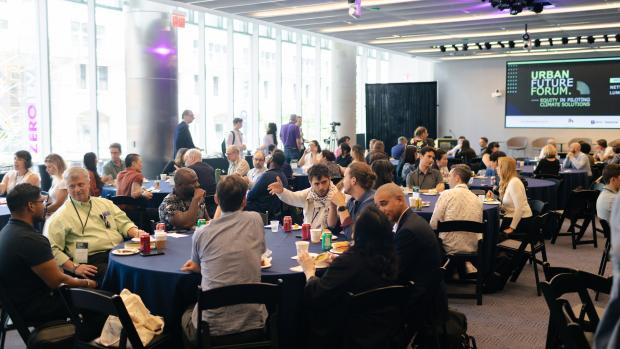The Urban Future Forum at NYU Tandon was focused on climate tech and equitable solutions

In late June, NYU Tandon hosted the first-ever Urban Future Forum, spearheaded by the Urban Future Lab with the help of a grant from the Wells Fargo Innovation Incubator (an initiative co-founded and co-administered by the National Renewable Energy Laboratory).
The event was dedicated to bringing together stakeholders from across the climate-tech ecosystem and opened with a speech by Timothy DiGuilo, Head of Sustainable Finance & Advisory at Wells Fargo, who emphasized the company’s commitment to sustainability, their strategic role in financing and advising companies towards climate resilience, and their commitment to impactful partnerships that advance clean technologies and talent development.
The takeaway – and a theme that resonated throughout the day: Every job has a climate connection, and this is an all-hands-on-deck moment in all industries.
Abby Jo Sigal, the Executive Director of the NYC Mayor's Office of Talent and Workforce Development delivered the keynote, touching upon the impact AI and other technological advances are having on the workforce; the importance of addressing historical environmental injustices, promoting community hiring, and multi-sectoral dialogues; and the introduction of New York City's Green Economy Action Plan, which includes investments in key hubs like the Brooklyn Navy Yard.
The Urban Future Forum also featured multiple panels, whose topics ranged from the importance of community involvement and targeted policy interventions to building a green workforce, among myriad others. The core questions explored by the participants included:
- How can innovators bake equity into their work and ensure that their efforts are not just add-ons but integral parts of internal goals?
- What constitutes effective and transparent communication throughout the innovation and deployment phases?
- What are the critical, yet often overlooked, industry challenges faced in piloting and deploying innovations? How can we address them?
- How can relevant organizations effectively include the community to keep equity top of mind and ensure inclusivity?
- What progress has been achieved in cultivating the green workforce and what remaining obstacles require attention?
Craig Wilson, Tandon’s Executive Director of Innovation and Entrepreneurship, asserted, “It's incredible to see the amount of progress that we've made. Community impact requires deep connection, real engagement, and making sure that we take into account all of the things that we've done in the past as we move forward into the future. We all have a role to play in making sure that we create a new, resilient, and decarbonized economy. Step one is to always listen.”
Frederic Clerc, the Interim Managing Director and Carbon to Value Initiative Director at the Urban Future Lab added, “By nature, innovators are enthusiastic about the positive impact of their technology, and they often overlook how it might affect the community where it will be deployed. Events like the Urban Future Forum are really critical for startups, especially at the early stage, to better understand what equity means in the context of their solution, and consider community benefits as early as possible.”
Discussing the impact of the event, Jeannette Williams, the Urban Future Lab’s COO, said: “We are exploring the unique role that incubators and accelerators can play in operationalizing a just transition, and taking the phrase from buzzy jargon to something actionable. We're excited that our attendees and speakers were part of the next iteration of our work, ensuring that community voices are heard and included in these vital climate innovation conversations.”
Featured participants
-
Adam Cohen (Co-Founder & CTO, NineDot Energy)
-
Annel Cabrera-Marus (Chief Program Officer, Green City Force)
-
Andrew MacCalla (CEO, Collective Energy Company)
-
Basil Alsubee (Program Manager and Climate Justice Advocate, Nos Quedamos)
-
Brett Branco (Director, Science and Resilience Institute at Jamaica Bay)
-
Carolyn Kissane (Associate Dean, NYU SPS Center for Global Affairs)
-
David Leezer (Engineering Manager - Retail AC and Innovations, Midea)
-
Eric Davis (Section Manager, Research & Development - Innovation Hub, Con Edison)
-
Jordan Bonomo (Senior Program Manager, Asset & Capital Management | Sustainability, NYCHA)
-
Michael DiRamio (Assistant Director, Energy & Climate Equity, NYSERDA)
-
Michael Yee (Director, Educational and Cultural Trust Fund of the Electric Industry)
-
Neil Padukone (Executive Director, City of New York Manufacturing and Industrial Innovation Council)
-
Paul Rothman (Director, Smart Cities + IoT at the New York City Office of Technology & Innovation)
-
Shubert Jacobs (Executive Director, Bronx Charter School for Better Learning)
-
Sara B. Chandler (Director of Innovation, Equity & Access, Elemental Excelerator)
-
Tameka Vasquez (Founder & Advisor, The Future Quo ™)
-
Vince Romanin (CEO & Founder, Gradient)




